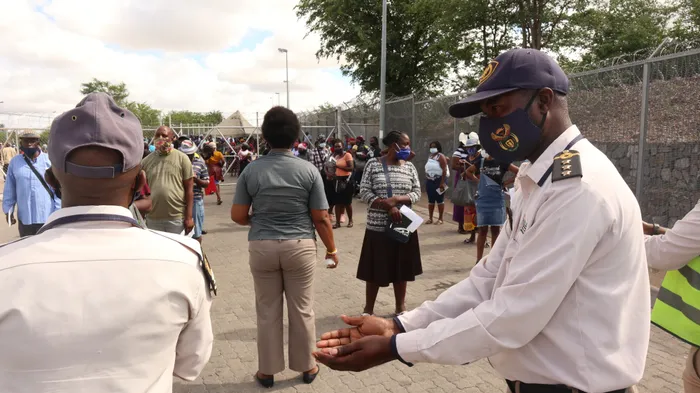Empowering Zimbabwean women informal cross-border traders: Prospects for AfCFTA?

Picture: Timothy Bernard / African News Agency (ANA) / Taken on January 4, 2021 – Beit Bridge border post between South Africa and Zimbabwe. As the world watches the unfolding narrative of African continental unity, manifested recently in the African Continental Free Trade Area, there’s both potential for monumental upliftment and a risk of continued oversight, the writer says.
By Nompumelelo Ndawonde
Crossing the Zimbabwe-South Africa border, one often witnesses an incredible testament to resilience and enterprise: Zimbabwean women, bearing goods, traversing with hope and tenacity. These cross-border informal traders are the unsung players of an economic ecosystem that feeds families and fuels micro-economies, but their journey is not without challenges.
As the world watches the unfolding narrative of African continental unity, manifested recently in the African Continental Free Trade Area (AfCFTA), there’s both potential for monumental upliftment and a risk of continued oversight.
Their experiences, challenges, and aspirations are emblematic of the hurdles and hopes of numerous African women in trade. The AfCFTA, designed to facilitate intra-Africa trade, has the potential to revolutionise, their prospects, but only if it is approached with consideration to gender-specific challenges.
The current landscape: Challenges Galore
Zimbabwean women traders routinely cross the border to South Africa, driven by a declining economy, insufficient job creation, hyperinflation and acute food security in households. Many who trade goods from South Africa are seeking better prices for their goods, or procuring products unavailable in Zimbabwe, and yet, this seemingly straightforward economic endeavour is fraught with difficulties.
Bribery at border posts, bureaucracy challenges, and the exploitation and confiscation of goods, are rife. The rebate policy (which does not allow one to import more than five items per product) has resulted in many bribing bus drivers who then bribe officials to avoid declaring goods and paying tariffs. There is also the issue of ever-changing customs regulations and the shadow of xenophobic attitudes. To avoid this, many have taken the dangerous route of using “mazalawi” women of Zimbabwean descent who transport goods purchased by informal traders from the South African side to the Zimbabwean side via the Limpopo River.
Sexual assault and physical and verbal harassment are a reality for many Zimbabwean women who are forced to use unofficial borders. Couple these challenges with the lack of access to formal banking, credit facilities, and business training, and the enormity of their daily struggle becomes evident. These challenges are not just logistical; they’re deeply systemic, rooted in gender biases and economic disparities. Without the protections and privileges that come with formalisation, many of these women are trapped in a cycle of poverty.
AfCFTA: A Silver Lining?
The advent of AfCFTA is positioned as a game-changer for Africa and a potential for an economic renaissance, promising increased trade, better access to markets, and potential economic diversification. It seeks to remove trade barriers, streamline customs procedures, and ultimately boost African economies by emphasising intercontinental business. But can it be the much-needed solution for Zimbabwean women informal cross-border traders?
With AfCFTA, there’s potential for these women to access broader African markets, not just South Africa. This diversification can stabilise their incomes, allowing them to be less dependent on one volatile market. A primary objective of AfCFTA is to simplify customs procedures, for informal traders, this can mean fewer chances of exploitation and a smoother passage, ensuring their goods reach their destinations quickly and profitably. Further, by acknowledging the role of small-scale and informal traders in the continental economy, AfCFTA could offer these women a platform for representation and advocacy, something that’s been sorely lacking.
The Way Forward
For the AfCFTA to truly serve Zimbabwean women cross-border traders, it must be implemented with a deep understanding of their unique needs and challenges.
Gender-sensitive training and skills development programmes tailored for these women, which address their specific challenges, can ensure they’re not left behind in the new trade order. As the borders open wider, there should be a concerted effort to ensure their safety and security, both in terms of fair customs practices and protection against harassment.
Financial inclusion is key – partnerships with micro-finance institutions and local banks can offer these women the financial tools they need to grow and stabilise their businesses. Further, the creation of advocacy platforms where these traders can voice their concerns and needs can ensure they’re not just passive participants but active shapers of the AfCFTA narrative.
In conclusion, the AfCFTA stands as one of the most significant economic reforms in African history. But its success, especially for marginalised communities like Zimbabwean women cross-border informal traders, hinges on a detailed, compassionate, and inclusive approach.
The promise can only be fully realised if the trade agreement goes beyond mere economic considerations and takes into account the social fabric of member countries, especially the concerns of its women.
Their resilience, determination, and economic contribution are not just footnotes in the larger story or statistics in a report, they are the heartbeat of communities, the backbone of local economies, and the hope for a more equitable and prosperous Africa.
As Africa moves forward, it must ensure it carries along its most tenacious, even if informal, traders.
Nompumelelo Ndawonde is a researcher at the University of Johannesburg’s (UJ’s) Institute for Pan-African Thought and Conversation (IPATC)